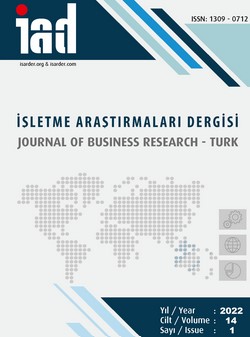Küçük ve Orta Ölçekli Konaklama İşletmelerinde Girişimcilik Yöneliminin İşletme Performansına Etkisi
The Effect of Entrepreneurial Orientation on Business Performance in Small and Medium-Sized Accommodation Enterprises
Author(s): Burcu Koç, İrfan YazıcıoğluSubject(s): Business Economy / Management, Micro-Economics, Accounting - Business Administration
Published by: İşletme Araştırmaları Dergisi
Keywords: Entrepreneurial Orientation; Business Performance; Long-Term Orientation; Strategic Flexibility; Environmental Uncertainty;
Summary/Abstract: Purpose: The main purpose of this study is to investigate the effects of innovativeness, risk-taking and proactiveness dimensions, generating entrepreneurial orientation, on performance of small and mediumsized accommodation enterprises. Business performance was measured in two ways: financial performance and non-financial performance. In addition to the relationship between long-term orientation and strategic flexibility, which are among the main indicators of business strategies, effects of those variables on entrepreneurial orientation and performance are also examined. The moderating role of environmental uncertainty in the relationships between entrepreneurial orientation dimensions and performance types is also tested. Design/methodology/approach: Data were collected from 334 accommodation businesses in 2018 through a survey form. Relationships between variables were tested using structural equation modeling. Findings: According to the findings, proactiveness and risk-taking significantly affect financial and nonfinancial performance. While proactiveness is positively associated with performance types, risk-taking has negative effects on both. Innovativeness only affects non-financial performance positively and significantly. Long-term orientation positively affects all dimensions of entrepreneurial orientation, strategic flexibility, and financial performance. Additionally, positive changes were detected in risktaking, innovativeness and non-financial performance when strategic flexibility is high. The moderating role of environmental uncertainty was only observed in the relationship patterns between proactiveness and performance types. Discussion: The number of tourism studies discussing the reflections of entrepreneurial orientation and organizational strategies such as long-term orientation or flexibility on performance from a cause-effect relationship perspective are insufficient in the literature. With this research, this deficiency has been remedied even if partially.
Journal: İşletme Araştırmaları Dergisi
- Issue Year: 14/2022
- Issue No: 1
- Page Range: 1041-1062
- Page Count: 22
- Language: Turkish

